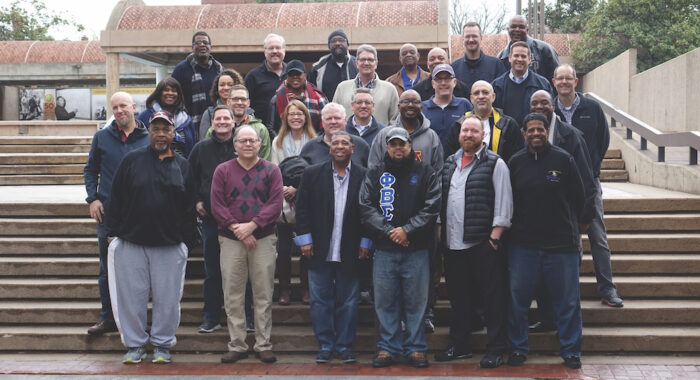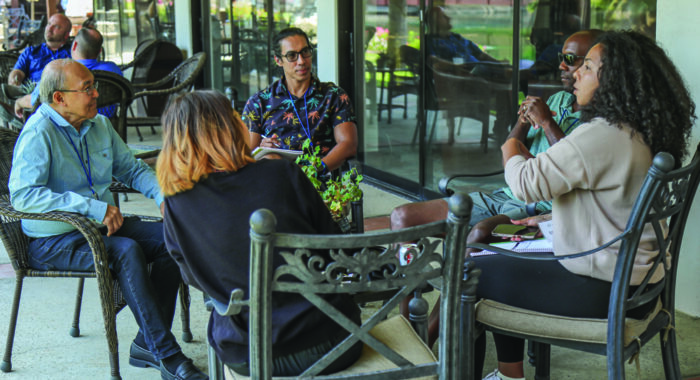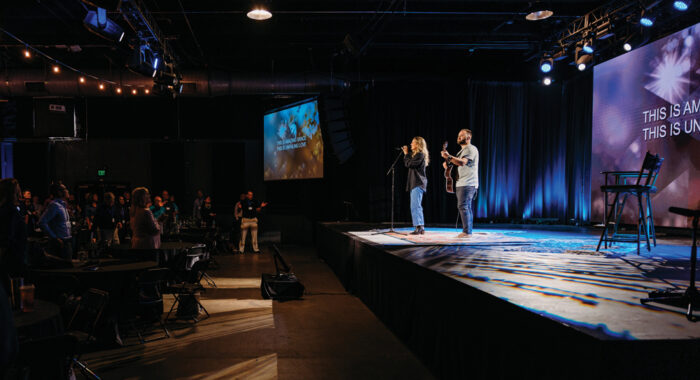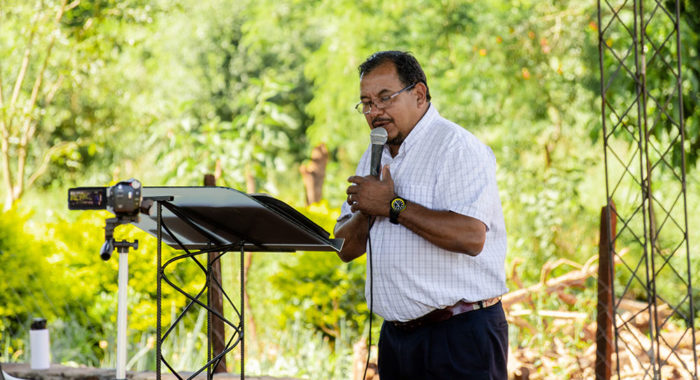Scott Ridout has been the president of Converge since 2014. Prior to his leadership post at Converge, Ridout was the lead pastor of Sun Valley Community Church in Gilbert, Arizona. During his tenure at Sun Valley, the church grew from 375 to roughly 5,000 attendees on three campuses. Ridout has also served six years as a Converge overseer, including two years as chairman. He is a church leadership mentor and continues coaching during his presidency. Ridout holds a B.S. in civil engineering from Virginia Polytechnic Institute and State University, and an M.Div. from Columbia International University.

On March 11, 2020, I arrived in Connecticut to work with a church on developing a long-term strategic plan. News of the advance of the COVID-19 virus in Washington and California had unsettled many in our country. Earlier that morning, I texted several of Converge’s larger churches, asking what adjustments they were making as a result of the spread. The mindset of all was “business as usual.” At least until that evening. That night my host and I watched President Trump address the nation on this issue. By the weekend, nine of the 10 pastors I had contacted transitioned to online-only for their worship services. Little did we know the impact of the coming storm.
Guides for the Course
Over the last few months, all of us sought understanding and answers on how to navigate the new normal. I gained significant help from three sources. First, Scripture. I have most often reflected on Philippians 1:12–14. Paul, writing from jail, addressed the church’s concerns about the effects of his “stay at home” scenario. He reminded them that while he was chained, the gospel was not. He chose to see God’s hand in his circumstances and was encouraged by the faith of other believers who saw his efforts to stay on mission. What some thought was a barrier, Paul saw as a bridge. What others saw as disruption, Paul recognized as dispersion.
The second source of help came from Henry Cloud, who hosted an online conversation on the Psychology of Crisis. In this webinar, he talked about the personal impact of crisis on individuals and specifically addressed the losses we all experience — rhythm of life, connection and purpose. He challenged his listener to help others re-establish these essentials.
Finally, I listened to Andy Crouch, a partner for culture and theology at Praxis. He shared his thoughts in a conversation called “Leading Beyond the Blizzard,” where he postulated that this could be a blizzard (last a few weeks), winter (lasting months) or a mini-ice age (having an impact for years to come). Little did we know how COVID-19 would have elements of all three. These three sources, the Apostle Paul, Henry Cloud and Andy Crouch, set a framework for how I would choose to approach the pandemic from spiritual, psychological and circumstantial angles.
Clarity and Innovation
Since March, we’ve seen the good, bad and ugly of the American church and society. In the church world, leaders instinctively began to define “church” not as a building we meet in, but as people of God doing the work of God for the glory of God. Leaders understand that, in times of uncertainty, the greatest need is clarity. Most ministries took the season to prioritize and simplify, discerning which ministries were “mission critical” and which were mission “supplemental or deficient.”
Mandated social-distancing requirements had a massive impact on church health. Groups, whether Sunday school or home groups, are the center of church life and health, as well as key components in disciple and leader reproduction. These limitations brought much-needed innovation, including the emergence of online options for services and giving, even by those who consistently rejected these methods in the past (Secondary issues in theology are sometimes adjusted by necessity). As I heard one of our pastors note, “In a time of instability, a key to leadership is agility.”
Caution Ahead
Despite some innovations, we are also experiencing significant negative effects. This crisis forced insulation, which many interpreted as isolation. While enjoying the convenience of online church, our individualistic, consumeristic society brought people to question the value of gathering for fellowship. While our faith is foundationally relational and incarnational, the view of church in the minds of some moved from the center of life to service provider. The devastating long-term impact of those who choose to “do church” on their own or exclusively online has yet to be experienced.
The most consistent negative impact of COVID-19 has been its impact on the church leader. Leaders speak of the heavier weight of leadership, the pressure of constant change, the drain of the unknown and the fear of not leading effectively. Many experience increased inner circle conflict, greater spiritual warfare and decreased personal patience and endurance. Add to that our lack of understanding of how to deal with the political polarity, social unrest and growing cancel culture of our time, and we have a perfect recipe for fail out, walk out and burnout of leaders.
Wisdom for What’s Next
Despite all this, I am hopeful. After all, the gospel continues to advance and the Church continues to prevail. For 2,000 years, the Church has prospered in persecution, plague, poverty and war. Why should this season be any different? The Bible says God’s Church is unstoppable (Matthew 16:18). Crisis turns people inward, but God sent the Church outward. This is not a time to survive but thrive. So, we continue to ask God for wisdom to find new ways.
When leaders ask, I suggest a course for navigating this next season.
1. Renew your personal rhythms.
Healthy churches are led by healthy leaders. New challenges, added pressure, greater restrictions and reduced connection have broken our mental, social and spiritual rhythms, yet most leaders continue in normal routines. We can’t expect “business as usual” regimens will suffice in a season that has been anything but routine! Rhythms of rest and work, exercise and diet, reflection and ministry, family and friends all need to be re-evaluated to find the right blend. We must find ways to develop life-giving thoughts, build life-giving relationships and engage in life-giving activities.
2. Reconnect people.
Churches have begun to meet in person in limited capacities. Pastors who have been taught about sensing “critical mass, momentum and morale” in crowd dynamics have expressed their concerns about the weekend experience. While the rooms have not been full, the hearts of those who attend are. God has designed people for relationship. There is a power to presence, a joy to joining with others. This is why, regardless of the form — services, small groups, Sunday school, home groups or hangouts, we have to get people together. In those settings, we will see spiritual, social, emotional and mental health and life re-emerge as they build friendships centered on God’s Word.
3. Redesign the road for two lanes.
Digital ministry is here to stay. Having experienced the convenience of digital offerings, people are more likely to change lanes between online and onsite. Knowing this, church leaders are charged to redefine and design the pathways to maturity. We understand that true spiritual maturity is living out the priorities of God in the character of Christ through the power of the Holy Spirit. So, it would be wise for leaders to define the marks of maturity in the life of a believer — attitudes, values, belief and behaviors regarding their relationships with God, self, family, work and world — and afterward to look at their programming, both online and in-person, to determine if believers can grow in maturity in either/both lanes.
4. Recast the vision.
Henry Cloud stated we lose purpose in crisis. Recasting vision renews the sense of purpose, moves us from a mindset of “survive” to “thrive” and refocuses our lives to live on mission. Most of all, vision creates hope and reminds us that God designed us to live for something bigger than ourselves. Reestablishing vision, direction and hope gives meaning, purpose and energy to life.
5. Refuel your joy.
The unrivaled power of our faith comes from adopting a mindset of humility, gratefulness and generosity. Humility shows our dependence on God. We should be more prayerful, more studious in God’s Word and more considerate of others. Gratitude focuses us on what we have, not what we don’t have or what we lost. It reminds us that God is in control. Gratitude is the path through grief and worship is the way to overcome fear. Generosity grounds our faith in God’s power and provision. It increases our impact and gives us a greater opportunity to talk about the hope that is within us. Humility, gratefulness and generosity are the elements necessary to navigate our present challenges, showing dependence, confidence and courage in God.
We’ve got a job to do. My prayer is that God will give you the wisdom and courage you need to accomplish all he has for the Church in this next season.
This article originally appeared in Evangelicals magazine.



 View All Articles
View All Articles 




























